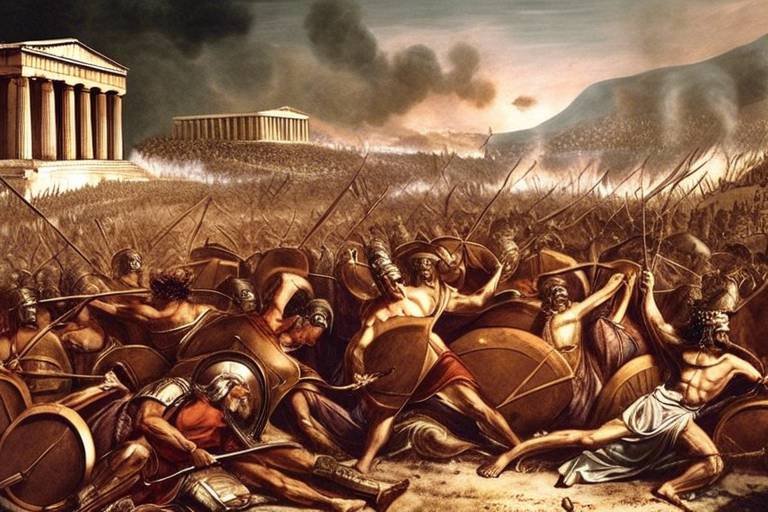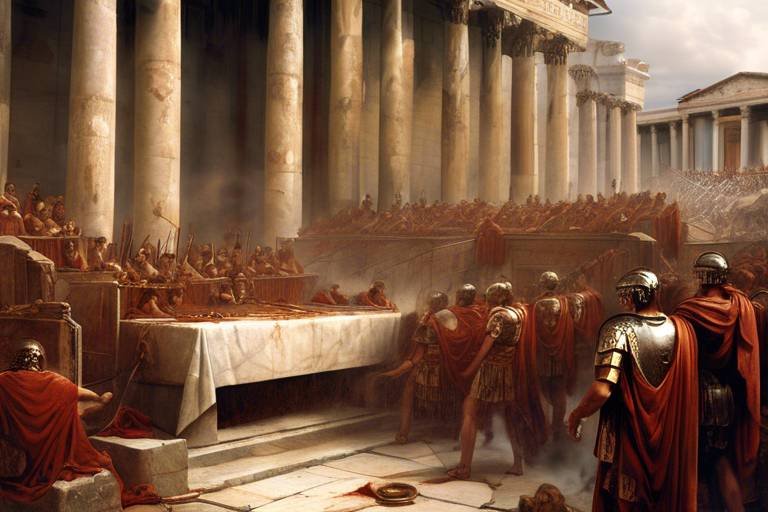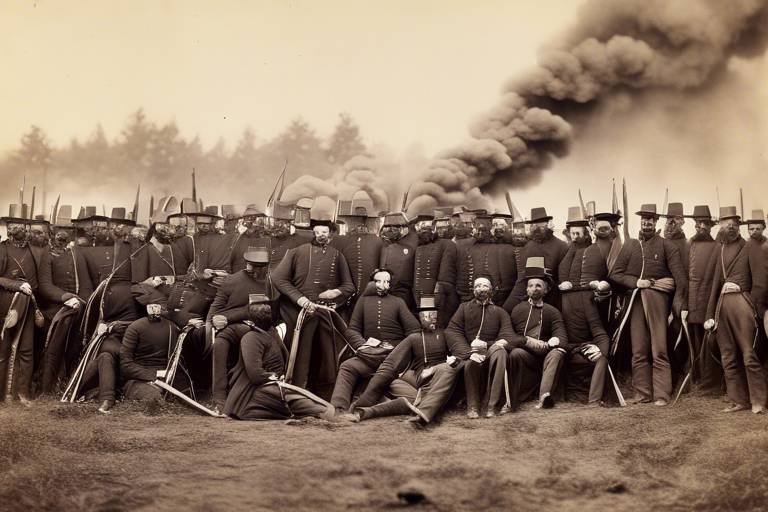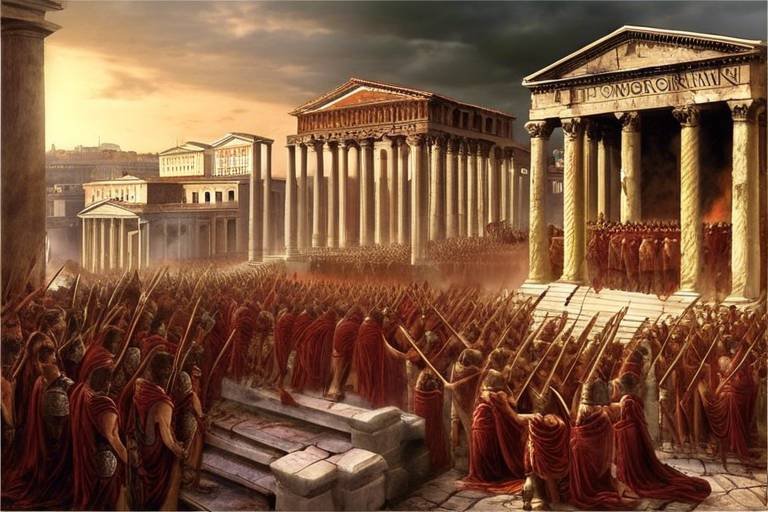The History of Ancient Greece - Major Battles and Events
Ancient Greece stands as a beacon of civilization, with its rich history shaped by major battles and pivotal events that continue to influence the world today. From the epic clashes of the Persian Wars to the rise of conquerors like Alexander the Great, the annals of Greek history are filled with tales of courage, intrigue, and innovation.
The Persian Wars marked a turning point for Greece, as the city-states united to defend against the mighty Persian Empire. The battles of Marathon, Thermopylae, and Salamis showcased the valor and determination of the Greek forces, securing their independence and shaping the course of history.
One of the most famous battles in ancient history, the Battle of Marathon, saw the Athenians defy all odds to defeat the Persian army. Through strategic brilliance and unwavering resolve, the Greeks achieved a remarkable victory that reverberated throughout the ages.
The Peloponnesian War, a protracted conflict between Athens and Sparta, brought about a period of strife and upheaval in Greece. Lasting nearly three decades, this war tested the limits of power and ambition, ultimately leading to the decline of Athenian supremacy.
Amidst the chaos of war, a young warrior named Alexander rose to prominence, earning the title of "the Great" through his unparalleled conquests. From Greece to Egypt and beyond, Alexander's empire reshaped the map of the ancient world, leaving a lasting legacy of ambition and conquest.
The Golden Age of Athens shone brightly during the 5th century BC, a time of cultural flourishing and intellectual enlightenment. Visionaries like Socrates, Plato, and Aristotle laid the foundation for Western philosophy, while artistic achievements and democratic ideals thrived in the heart of the city.
At the narrow pass of Thermopylae, King Leonidas and his 300 Spartans made a stand that would echo through the ages. Their heroic sacrifice against overwhelming odds became a symbol of courage and defiance, inspiring generations to come.
The Delian League, initially formed for mutual defense against Persian threats, evolved into an Athenian empire with far-reaching consequences. The political and economic implications of this alliance reshaped the balance of power among the Greek city-states, setting the stage for future conflicts and alliances.
As we reflect on the legacy of Ancient Greece, we see a civilization that continues to shape our world in profound ways. From its political ideals and artistic achievements to its philosophical insights and scientific breakthroughs, the influence of ancient Greece endures, reminding us of the enduring power of human creativity and innovation.

The Persian Wars
The Persian Wars were a series of conflicts that took place between the Greek city-states and the mighty Persian Empire in the 5th century BC. These wars were a crucial turning point in the history of Ancient Greece, shaping the future of the region in profound ways. One of the most famous battles of the Persian Wars was the Battle of Marathon, where the outnumbered Athenians achieved a remarkable victory against the Persian forces.
These wars were not just about military conquest; they were also a clash of civilizations and ideologies. The Greeks fought fiercely to defend their freedom and independence against the Persian invaders, who sought to expand their empire into Greek territory. The battles of Thermopylae and Salamis further highlighted the courage and determination of the Greek city-states in the face of overwhelming odds.
One of the key outcomes of the Persian Wars was the sense of unity and solidarity that emerged among the Greek city-states. Despite their internal rivalries and conflicts, the Greeks banded together to repel the Persian threat, demonstrating the strength of their collective spirit. This newfound unity laid the foundation for the rise of Athens as a dominant power in the region.
The Persian Wars also had a lasting impact on the development of Greek culture and identity. The victories against the Persians instilled a sense of pride and confidence in the Greek city-states, fueling a period of cultural flourishing known as the Golden Age of Athens. This era saw the emergence of great thinkers, artists, and philosophers who made significant contributions to Western civilization.
In conclusion, the Persian Wars were a defining chapter in the history of Ancient Greece, showcasing the resilience and valor of the Greek people in the face of external threats. These conflicts not only shaped the political landscape of the region but also left a lasting legacy that continues to influence the modern world.
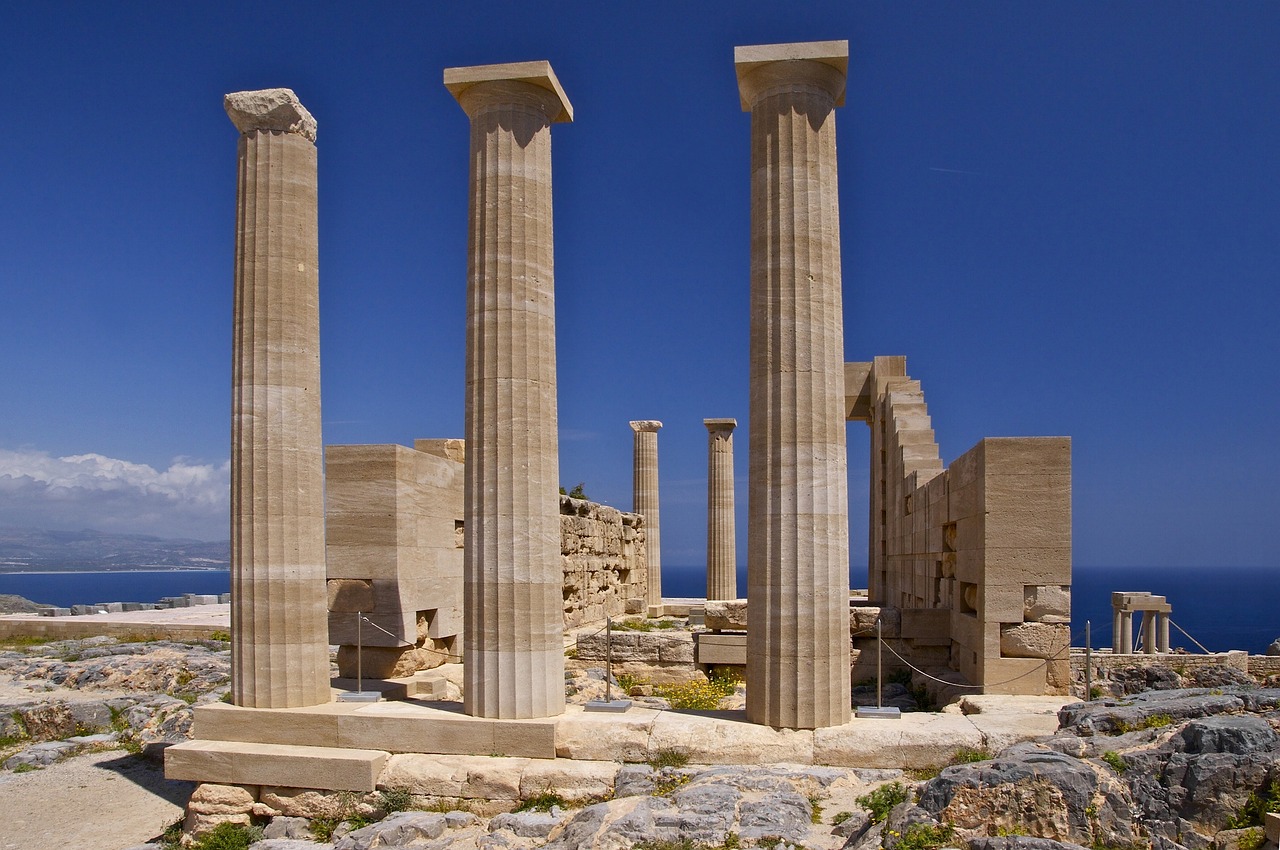
The Peloponnesian War
The Peloponnesian War was a significant conflict that took place between Athens and Sparta, lasting for almost three decades. This destructive war had far-reaching consequences, not only for the two powerful city-states but also for the entire Greek world. The root causes of the Peloponnesian War can be traced back to the growing tensions between Athens, with its powerful navy and democratic government, and Sparta, known for its strong army and oligarchic system.
As the war unfolded, both sides engaged in a series of battles and strategic maneuvers to gain the upper hand. One of the key moments of the Peloponnesian War was the brutal siege of Plataea, where the Spartans laid siege to the city for years, resulting in immense suffering for its inhabitants. The conflict also saw the rise of influential leaders such as Pericles in Athens and Brasidas in Sparta, who played pivotal roles in shaping the course of the war.
Despite the devastating impact of the Peloponnesian War on both Athens and Sparta, it ultimately led to the decline of Athenian power and influence in the region. The protracted conflict drained the resources and manpower of both city-states, weakening them and making them vulnerable to external threats. The war also highlighted the limitations of Greek unity and exposed the deep-seated rivalries and divisions among the various city-states.
Moreover, the Peloponnesian War had a profound impact on the social and political landscape of ancient Greece. It marked the end of the golden age of Athenian democracy and ushered in a period of instability and uncertainty for the Greek world. The war left a lasting legacy of distrust and animosity between Athens and Sparta, shaping the future dynamics of power and alliances in the region.

The Battle of Marathon
The Battle of Marathon holds a significant place in the history of Ancient Greece as a pivotal moment that showcased the valor and strategic prowess of the Athenians. This historic battle, fought in 490 BC, saw the outnumbered Athenian army, led by General Miltiades, decisively defeat the mighty Persian forces. The Persian King Darius I had launched an invasion of Greece, seeking to punish Athens for supporting the Ionian Revolt against Persian rule.
Despite being vastly outnumbered, with around 10,000 Athenian soldiers facing an estimated 25,000 to 100,000 Persian troops, the Athenians managed to secure a remarkable victory. Utilizing superior tactics and knowledge of the terrain, the Athenians outmaneuvered the Persians, resulting in a stunning triumph that reverberated throughout Greece.
One of the most iconic aspects of the Battle of Marathon is the legendary run of the Athenian soldier Pheidippides, who covered the distance of approximately 26 miles to deliver the news of the victory to Athens. This feat later inspired the modern-day marathon race, commemorating the endurance and determination displayed by Pheidippides.
The Battle of Marathon not only safeguarded the independence of Athens but also served as a symbol of Greek unity and defiance against foreign aggression. The strategic acumen and bravery exhibited by the Athenians in this battle laid the foundation for future conflicts and solidified their reputation as formidable warriors.

The Rise of Alexander the Great
During the tumultuous period of Ancient Greece, one figure rose to prominence and left an indelible mark on history - Alexander the Great. Born in 356 BC in the kingdom of Macedon, Alexander III would go on to become one of the most successful military commanders of all time. His conquests would reshape the known world, establishing an empire that stretched from Greece to Egypt and as far as India.
Alexander's military campaigns were marked by strategic brilliance and daring maneuvers. He inherited a strong army from his father, King Philip II, and further honed its capabilities through innovative tactics and unwavering leadership. From the swift victory at the Battle of Granicus to the decisive triumph at Gaugamela, Alexander's military prowess was unmatched.
One of the defining characteristics of Alexander's reign was his ability to inspire unwavering loyalty among his troops. His men, known as the Macedonian phalanx, followed him into the most challenging battles with unwavering devotion. This bond of trust and camaraderie was a crucial factor in Alexander's success on the battlefield.
Besides his military conquests, Alexander was also a visionary leader who sought to blend Greek and Eastern cultures. He founded numerous cities, many of which bore his name, to serve as centers of Hellenistic civilization. These cities became hubs of trade, culture, and learning, fostering a rich exchange of ideas between different peoples.
Tragically, Alexander's meteoric rise was cut short by his untimely death at the age of 32. The exact circumstances of his demise remain shrouded in mystery, fueling speculation and intrigue throughout the centuries. Despite his premature passing, Alexander's legacy endured, leaving an indelible imprint on the course of history.

The Golden Age of Athens
The Golden Age of Athens, spanning the 5th century BC, was a remarkable period in the history of Ancient Greece characterized by cultural flourishing, artistic achievements, and the development of democracy. This era witnessed the rise of great thinkers such as Socrates, Plato, and Aristotle, who laid the foundation for Western philosophy with their profound ideas and teachings. The city-state of Athens, under the leadership of Pericles, experienced a golden era of intellectual and artistic growth, leaving a lasting impact on the world.
Athens became a hub of creativity and innovation, with advancements in architecture, sculpture, drama, and literature. The construction of the Parthenon on the Acropolis symbolized the peak of Athenian artistic achievement, showcasing the city's dedication to beauty and harmony in architecture. Playwrights like Aeschylus, Sophocles, and Euripides produced timeless tragedies that explored complex themes of fate, morality, and human nature, influencing storytelling for centuries to come.
The democratic system in Athens flourished during this period, with citizens actively participating in decision-making processes and shaping the political landscape. The concept of democracy, meaning "rule by the people," was refined and implemented in the Athenian city-state, setting a precedent for future democratic societies. The Athenian democracy allowed for a level of individual freedom and civic engagement that was revolutionary for its time.
Moreover, the Golden Age of Athens was not limited to artistic and political achievements but also extended to intellectual pursuits. Philosophers like Socrates, known for his Socratic method of questioning, encouraged critical thinking and self-examination among his students. Plato, a student of Socrates, founded the Academy, one of the earliest institutions of higher learning in the Western world, while Aristotle's contributions to logic, metaphysics, and ethics shaped the course of philosophy.
In conclusion, the Golden Age of Athens stands as a beacon of intellectual, artistic, and democratic excellence in the annals of history. The legacy of this period continues to inspire and influence modern societies, reminding us of the enduring impact of Ancient Greece on the development of Western civilization.
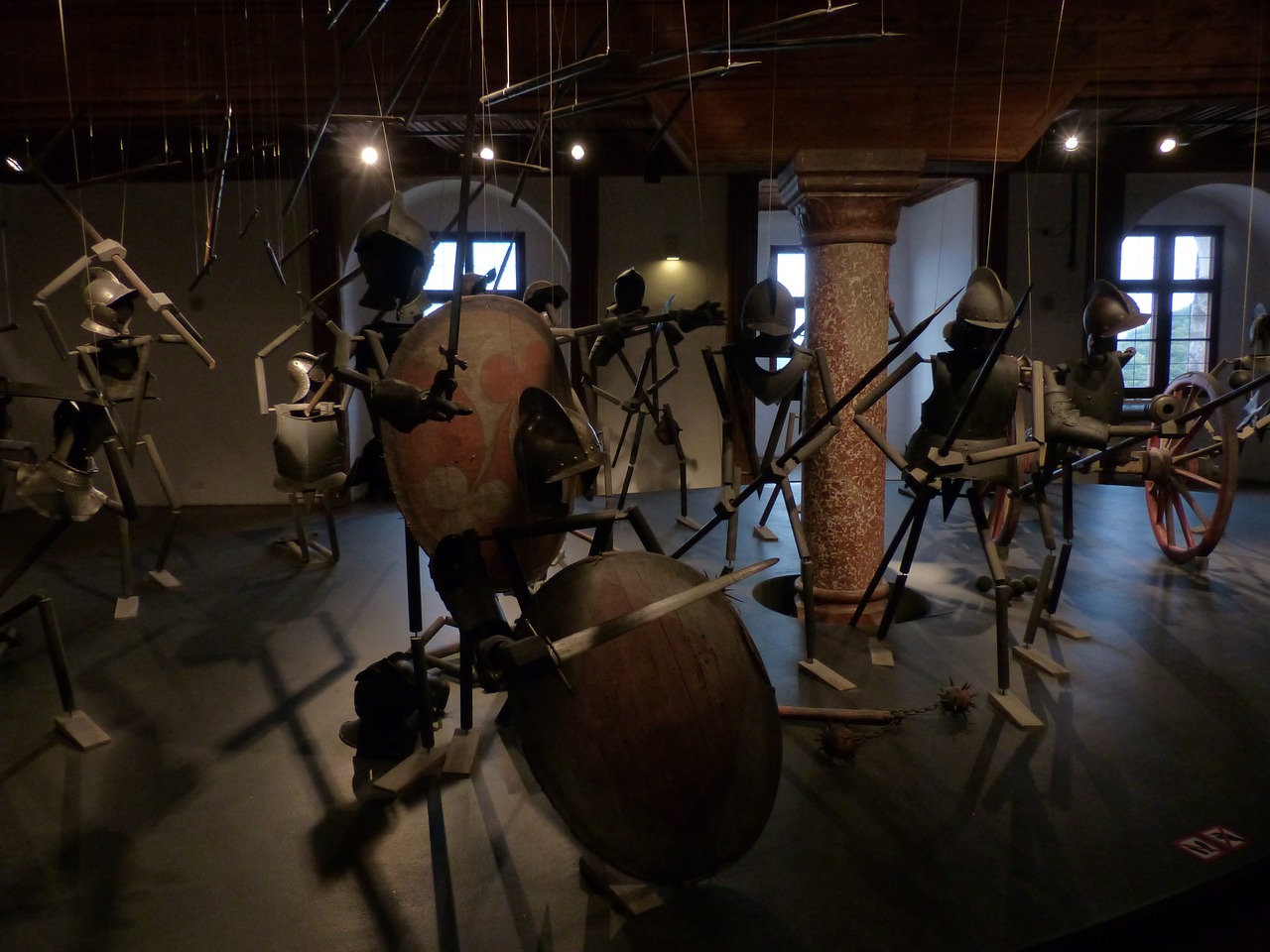
The Battle of Thermopylae
The Battle of Thermopylae is one of the most legendary battles in ancient Greek history, symbolizing bravery and sacrifice in the face of overwhelming odds. This historic clash took place in 480 BC when King Leonidas of Sparta led a small force of 300 Spartans, along with other Greek allies, to defend the narrow pass of Thermopylae against the massive Persian army led by King Xerxes.
The strategic location of Thermopylae, with its steep cliffs on one side and the sea on the other, provided a natural bottleneck that favored the defending Greek forces. Despite being vastly outnumbered, the Greeks, under the leadership of King Leonidas, put up a fierce resistance, inflicting heavy casualties on the Persian army.
King Leonidas and his Spartans displayed unparalleled courage and discipline, holding off the Persian advance for several days. Their heroic stand bought valuable time for the rest of the Greek city-states to prepare for the looming threat posed by the Persian invasion.
Ultimately, the Battle of Thermopylae ended in defeat for the Greeks as a local shepherd betrayed a mountain path to the Persians, allowing them to outflank the Greek forces. King Leonidas and his 300 Spartans fought bravely to the last man, becoming symbols of selfless sacrifice and unwavering loyalty to their homeland.
The legacy of the Battle of Thermopylae transcends its military significance, serving as a timeless example of resilience and defiance in the face of tyranny. The story of the 300 Spartans has inspired countless generations, highlighting the power of determination and unity in the most challenging of circumstances.

The Delian League
The Delian League was an alliance formed by Athens and several other Greek city-states following the Persian Wars to protect against further Persian invasions. Initially, the contributions to the league were voluntary, with member states providing either ships or funds for the common defense. However, over time, Athens began to exert more control over the league, using its powerful navy to enforce its dominance.
As the league evolved, Athens moved the treasury from the island of Delos to Athens itself, leading to accusations of imperialism and exploitation by other member states. This shift marked the transformation of the Delian League into the Athenian Empire, with Athens imposing tribute payments on its allies and using the league's resources for its own benefit.
The Delian League's dominance eventually led to resentment among its members, particularly Sparta, which viewed Athens as a threat to Greek autonomy. This tension ultimately contributed to the outbreak of the Peloponnesian War, as Sparta and its allies sought to challenge Athens' growing power and influence in the region.

The Legacy of Ancient Greece
The legacy of Ancient Greece is a profound and enduring influence on Western civilization, shaping various aspects of our modern world. From its political ideas to its artistic achievements, philosophical concepts, and scientific advancements, Ancient Greece has left an indelible mark on history.
One of the most significant contributions of Ancient Greece is its political legacy. The concept of democracy, born in Athens, laid the foundation for modern democratic systems around the world. The idea that citizens have a voice in governance and the right to participate in decision-making processes is a fundamental principle that originated in Ancient Greece.
Ancient Greece also made remarkable strides in the realm of art and architecture. The Greeks perfected the art of sculpture, creating lifelike statues that captured the beauty and essence of the human form. Their architectural achievements, such as the Parthenon in Athens, continue to inspire awe and admiration to this day.
Philosophy flourished in Ancient Greece, with great thinkers like Socrates, Plato, and Aristotle shaping the course of Western philosophical thought. Their inquiries into ethics, metaphysics, and logic laid the groundwork for philosophical inquiry that continues to influence intellectual discourse.
Ancient Greece was also a hub of scientific innovation, with scholars making significant advancements in fields such as mathematics, astronomy, and medicine. The work of figures like Pythagoras, Euclid, and Hippocrates set the stage for future scientific developments and discoveries.
The legacy of Ancient Greece extends beyond its intellectual and cultural contributions to encompass its enduring impact on literature, drama, and sports. The epic poems of Homer, the tragedies of Sophocles and Euripides, and the athletic competitions of the Olympic Games are all part of the rich tapestry of Greek heritage that continues to resonate in contemporary society.
In conclusion, the legacy of Ancient Greece is a testament to the creativity, ingenuity, and vision of a civilization that laid the groundwork for the world we inhabit today. By exploring and understanding the achievements of Ancient Greece, we gain insights into our own cultural heritage and the enduring legacy of one of history's most influential civilizations.
Frequently Asked Questions
- What were the Persian Wars?
The Persian Wars were a series of conflicts between the Greek city-states and the Persian Empire in the 5th century BC. These wars included famous battles such as Marathon, Thermopylae, and Salamis, which played a significant role in shaping Greek history.
- Who was Alexander the Great?
Alexander the Great, also known as Alexander III of Macedon, was a renowned ancient Greek king and military commander. He is famous for his conquests that led to the creation of one of the largest empires in history, stretching from Greece to Egypt and India.
- What was the Delian League?
The Delian League was an alliance formed by Athens and its allies to defend against Persian threats after the Persian Wars. Over time, the league transformed into an Athenian empire, impacting the political and economic landscape of Greek city-states.

